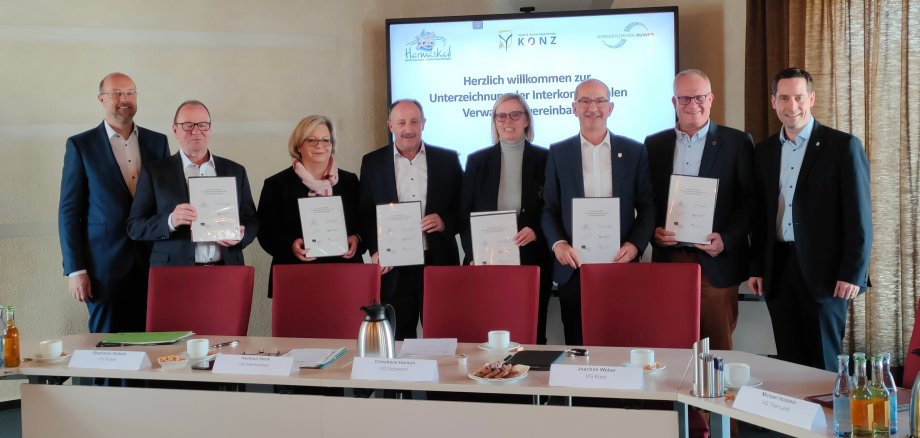Mutual support in the event of a computer emergency
The tasks arising from local administration are becoming more complex and require increasingly creative solutions. Networking and cooperation can be central instruments for this. On March 2nd, 2023, the office managers and IT administrators of all municipalities in the Trier-Saarburg district met in Hermeskeil to discuss the topic of “mutual help and support in the event of a successful cyber attack, an unusual natural event or another disaster with a failure “To exchange mutual support in the event of a cyber attack”. The background was the successful attacks on the IT infrastructure of various Rhineland-Palatinate administrations Rhine-Palatinate district in October 2022 and the town hall fire in Saarburg.
The event was professionally supported by SECURiON Rheinland-Pfalz GmbH. This is a consulting company for the municipal associations of Rhineland-Palatinate. It supports administrations on information security and data protection issues.
At this meeting there was an extensive discussion on the topic of “Security in the event of a cyber attack” and what needs to be taken into account and it was agreed in the group that no one is immune from becoming a victim of a successful attack.
At this meeting there was an extensive exchange between the district's association communities and everyone agreed that no one is immune from these dangers.
The rapid changes in the framework conditions for municipal action present municipalities with the challenge of remaining livable and attractive for their citizens.
The uncomplicated creation, retrieval, processing or exchange of data, regardless of the place of work, generally leads to more functionality, flexibility and more productivity in administrative processes. However, the more digital an administration is, the more dependent it is on functioning IT equipment.
In addition to the increased security requirements, for which each administration is initially responsible, the question was raised at the meeting as to what happens if one of us is affected and the administration's IT infrastructure does not work.
The participants quickly agreed that they would support each other and that an affected administration would receive help.
This help was recorded in an inter-municipal administrative agreement. It documents, on the one hand, that the risk of a failure of the IT infrastructure is known and, on the other hand, that the collective municipalities within the Trier-Saarburg district stand together in such a case and are prepared to help each other directly. By setting out the possible measures in writing, it is hoped that more effective and faster support can be provided and the necessary framework can be set for consultations and coordination. In such cases, time and specialist knowledge are the basis for averting the worst.
The inter-municipal administrative agreement contains the following key points:
Services for citizens
It was clear from the start that there had to be solutions in particular in the ID and registration systems as well as in the registry office system. These services must be able to be provided to citizens immediately. This is possible because all registration data in Rhineland-Palatinate is stored centrally and is used through a nationwide, uniform program. This means that ID and registration services as well as registry services can also be offered at other locations. As a result, it was agreed that these services would be provided in a neighboring municipality until the system in the affected municipality was restored.
Due to the local proximity, pairs were formed to provide the services at the other administration's location in an emergency. This service is provided mutually at the locations of VG Hermeskeil and VG Ruwer, VG Konz and VG Saarburg-Kell as well as VG Trier-Land and VG Schweich. The timely restoration of services in the area of citizen services is therefore ensured.
Technical support
The consensus is that in an emergency, all other administrative districts will provide short-term support to the affected administration within the scope of their human and technical resources. If necessary, employees from other administrations will be sent to the affected administration to provide temporary support. The type and extent of the deployment will be agreed on a case-by-case basis.
Payment transactions
So that companies and suppliers do not have to wait months for their invoices to be paid after the IT system of a municipality fails, a neighboring administration will set up temporary payment of these invoices. The administration concerned will manage its own accounts. This does not affect the financial resources of the supporting administration.
In summary, the inter-municipal administrative agreement to be concluded today is an example of how numerous municipal tasks can be solved better in partnership than if tasks were carried out by individual municipalities. At the same time, the independence and identity of the individual municipalities as well as the identification of citizens with “their” municipality are preserved. The collaboration supports ensuring the provision of services despite a shortage of skilled workers with efficiency gains and maintaining high service quality as well as proximity to citizens. Without additional costs, administrations can prepare for the challenges of the future and prepare responsibly within their means.
This agreement is intended to be a first step towards generating synergy effects through joint projects in the future. The municipalities have similar problems that can certainly be addressed together. We can work together, particularly in the area of IT infrastructure.

